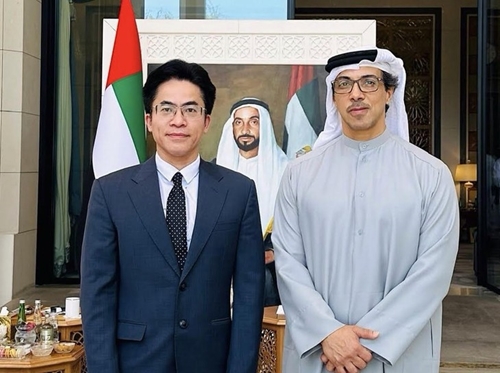In an interview granted to the Vietnam News Agency, Diep stressed that this is the first visit to the Middle East country by a Vietnamese Prime Minister in 15 years. It is expected to create motivation and expand a new phase of cooperation between the two countries, particularly in attracting investment from the UAE to Vietnam and facilitating the Vietnamese products' entry into the Gulf market.
    |
 |
|
Ambassador Nguyen Thanh Diep and UAE Vice President Sheikh Mansour bin Zayed Al Nahyan (Photo: Vietnamese Embassy in UAE) |
During PM Pham Minh Chinh’s visit, the two sides plan to sign the Comprehensive Economic Partnership Agreement (CEPA) and hold a business forum. They will discuss measures to strengthen coordination at regional and global forums and organizations; create breakthroughs in bilateral economic, trade and investment ties; strengthen people-to-people exchanges; step up collaboration in security, education, labor, climate change, environment and many other sectors; and accelerate the signing of cooperation documents to consolidate the legal framework for bilateral cooperation, Diep underscored.
Evaluating the Vietnam-UAE cooperation potential, the Vietnamese diplomat expressed his belief that with the signing of the CEPA, the bilateral ties across all areas will continue thriving in the coming time, elaborating the agreement, the first free trade pact that Vietnam has ever negotiated with an Arabic nation in the Middle East, will open up great prospects and a new period of strategic cooperation between the two countries.
He described the CEPA as a legal basis to bolster their economic cooperation through reducing or eliminating tariffs on goods and services while providing opportunities for the two sides to improve market access, promote foreign direct investment (FDI) flows and create new cooperation chances in several key areas.
The bilateral cooperation across trade, investment, economy, industry, energy, logistics, agriculture and infrastructure, high technology, digital transformation, green transition, innovation, labor and tourism will be pushed thanks to the CEPA, he said.
Diep went on to highlight several favorable factors for Vietnamese products to break into the UAE market, including the robust bilateral relations and increasing political trust, with the UAE leaders hoping to bring the ties with Vietnam to a higher level; the UAE’s high demand for imports; and Vietnam’s stable socio-political situation, great economic potential and size, sound infrastructure, smart governance and dynamic market.
However, he described high shipping costs and fierce competition from India and Pakistan as big challenges for Vietnamese enterprises to enter the UAE market.
With a view to bolstering the bilateral ties in economy, trade and investment, Diep said the two countries should promote high-level visits, upgrade their relations and boost political trust, creating a premise for the expanded economic cooperation.
The elevation of the bilateral relations is important to the UAE to expand collaboration and investment in the areas of its interests such as high technology, clean energy, AI, computing technology and semiconductors, he said, adding the move will create opportunities for Vietnamese tech giants like FPT, Viettel and Vingroup.
With trade and investment, it is necessary for the two countries to develop the Halal market, provide support for businesses that produce and export Halal products, and assist Vietnamese goods to join the UAE and the region’s supply chains to meet Muslim visitors’ demand, he said, suggesting Vietnamese firms focus on products boasting competitive edges and meeting UAE consumers’ taste.
Additionally, he recommended the establishment of a Vietnamese business association in the UAE which will provide information and consultations for enterprises to minimize trade disputes and fraud.
A join working group should be set up to share information and connect potential projects and partners between the two sides as well as promote UAE investment in areas of Vietnam’s strengths like renewable energy, oil and gas, logistics, real estate, energy and industrial infrastructure, and industrial waste treatment, he added.
Source: VNA